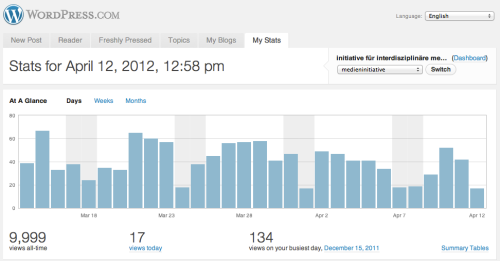
10,000: As of today, the number of page views on this blog since its inception in May 2011.
Today, sometime between 1:00 and 3:30 p.m., this blog had its 10,000th page view, when a visitor from either Spain, Canada, or Germany (in which case it was very possibly my wife) clicked on this site, either deliberately or (as I’m told happens occasionally on the interwebs) by chance.
Admittedly, 10,000 hits over the course of 11 months is not a whole lot in comparison with the kind of traffic that corporate sites, media outlets, universities, or even some of the more popular academic bloggers get, but it’s nevertheless not an altogether insignificant milestone for a fledgling media initiative at a German university posting largely on local events, niche-interest topics like seriality or posthumanism, or whatever happens to interest me at the time.
I thought I’d take the opportunity, therefore, to review and take stock of things. Luckily, WordPress provides a range of interesting statistics that are perfect for this kind of occasion.
To start with, 122 posts (this one included) have been made since I set up the blog on May 5, 2011. There were only 2 visitors to the blog that May (I didn’t go public with the blog until June, so who knows what led those two poor souls here then), roughly 200 hits in June, and since November 2011 the blog’s been averaging about 1500 monthly page views.
The five most popular pages have been: 1. the main landing page (4,668 hits), 2. Conference Program: “Cultural Distinctions Remediated” (detailing the conference we held here in December 2011; 366 hits), 3. the About page (235 hits), 4. Bollywood Nation (our film series in the winter semester 2011/2012; 188 hits), and 5. Bollywood Nation: Background / Context (likewise 188 hits).
Most people arrive here by way of a search engine (4,260 referrals total, including 3,329 from Google Image Search, 838 from “normal” Google searches, 28 from Bing, and a handful of others). There have also been 485 referrals from Facebook, 279 from Twitter, 259 from the English department at the Leibniz Universität Hannover, 93 from Jason Mittell’s blog Just TV, 93 from the homepage of the Popular Seriality research group, and lately an increasing number of referrals from Jussi Parikka’s Machinology blog, Steven Shaviro’s The Pinocchio Theory, Dylan Trigg’s Side Effects, and Bernard Dionysus Geogehan’s homepage.
Lately we’ve seen more and more people landing here deliberately (as evidenced by these referrals and the increasing number of people searching for terms like “medieninitiative hannover” or “denson postnaturalism”), but the list of top search terms evidences a mixed audience of intentional and accidental readers. The all-time top five search terms are: 1. television, 2. cheezburger 
And finally, WordPress has recently started providing statistics on the countries where the blog’s visitors (or at least their IP addresses) are located. Statistics are only available since February 25, but since then the top five countries have been: 1. United States (454 hits), 2. Germany (437), 3. United Kingdom and Canada (tied at 177 each), 4. India (103), and 5. Australia (69).
So that’s where we’ve been, but where is the blog heading? What does the future hold? To be sure, only time will tell, but a number of things are in the works right now: the Media Initiative continues to develop, and a number of media-related events are being planned in Hannover (and elsewhere), so be on the lookout, and consider subscribing to the blog via e-mail (you can sign up on the right), an RSS reader of your choice, or your WordPress account, for example. Additionally, spread the word via your favorite social network, blog, or other modern mode of communicative being. And if that’s not enough, don’t forget: we’ve got plenty of cheezburgers, traffic, and metabolism for all your spambots!
